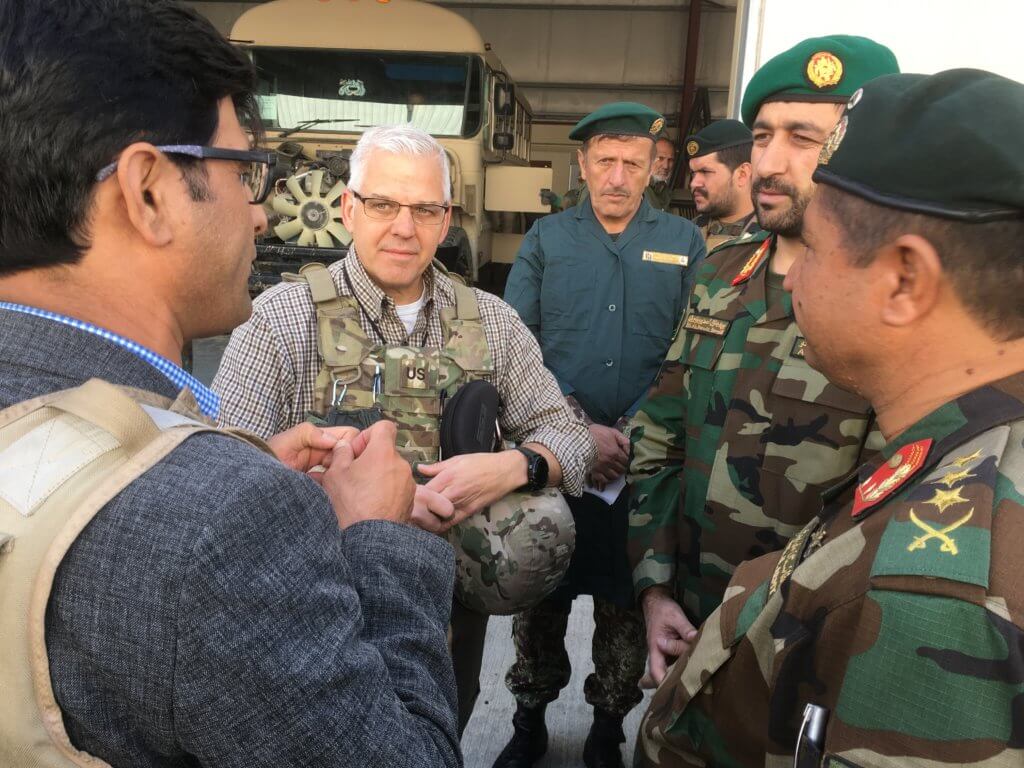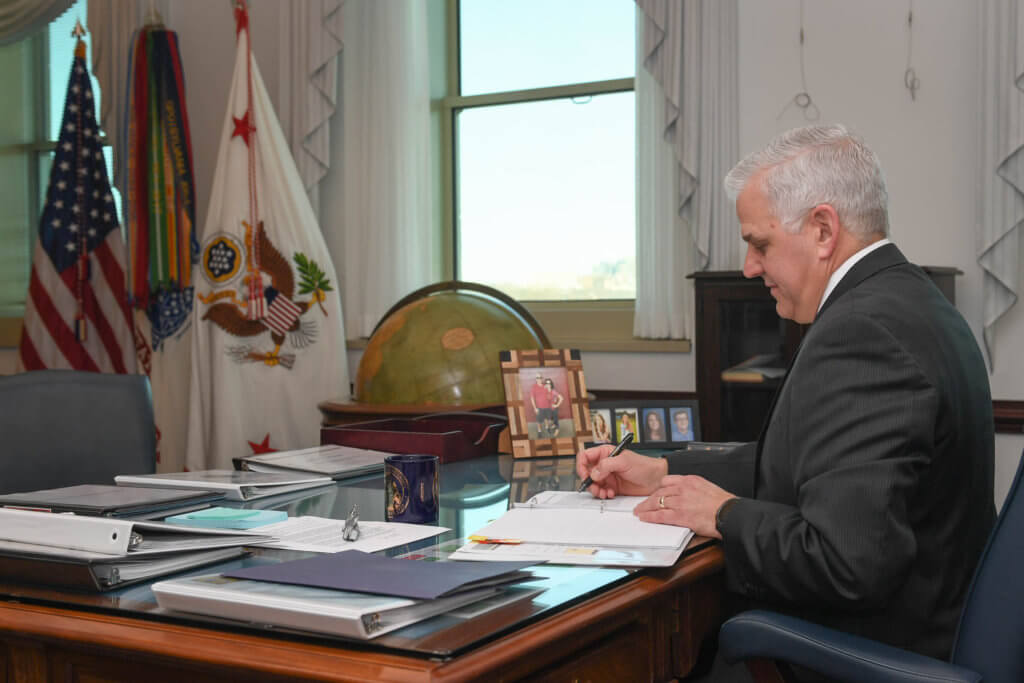
Our Man in the Pentagon
Here’s Christopher Lowman ’94, ’96M, on the phone from his Pentagon office, leading the U.S. Army at a level few will ever reach—and explaining his prestigious role for those who don’t quite understand it:
“I think it’s analogous to the CMO in a large corporation,” he says. “We have a secretary of the Army—that would be the CEO—and then the under secretary is really the chief management officer.” That makes Lowman the Army’s second highest-ranking civilian leader right now.
“This is a big deal—a job that only the best are selected for,” says Brigadier General Martin F. Klein, who has worked in the Pentagon for over a decade.
“Both humbling and an honor” is how Lowman, a Marine Corps veteran who joined the Army as a civilian employee in 1989, describes it. He spent the last 32 years advancing from “an extraordinarily low position” to eventually become the acting under secretary on Jan. 20, 2021. Only a few dozen people have ever held the title, interim appointments included, since its debut in 1947.
But to those who have worked with him, it’s not surprising that Lowman is now one of them. “Mr. Lowman is very well-versed in the way that the Pentagon runs, and is considered one of the most gifted senior leaders in terms of understanding how to steer issues within the Pentagon and get things done,” says Klein. “Now he’s in a position to make enduring change for our Army and for our nation.”
As under secretary, Lowman heads up three crucial areas of Army management. The first is “anything related to people,” he says—and with a million soldiers in uniform right now, their 1.2 million dependents, another million veterans, and roughly 300,000 people who, like Lowman himself, work for the Army as civilians, there is no shortage of people-related issues to tackle. Second and third, he oversees the Army’s commitment to modernizing and its ongoing readiness.

He arrived in the role at a time of transition: after the Trump-nominated under secretary left and before a Biden-selected, Senate-confirmed replacement has been named. Until then, Lowman will continue to act as “senior official performing the duties of under secretary of the Army.”
“It’s a big job in a large organization with a very important mission,” he says. But it’s also “a challenge that I think I’ve prepared for my entire life.”
Born into a family that prized “serving something larger than yourself,” Lowman spent most of his childhood in Germany, where his father worked for the U.S. Army as a civilian. After enlisting in the Marine Corps and then following his dad’s lead into Army civilian service, Lowman found himself assigned to Fort Monmouth, New Jersey in 1990.
“That’s when I realized I could rise to a certain level, but I was going to need a college degree to progress further,” he says.
So at 22 years old, and working full time during the day, he enrolled as a freshman at Monmouth. Thanks to nighttime, weekend, and lunch-break classes, he zipped through his B.S. in business administration and management in just four years. From there, it was straight on to an MBA, also at Monmouth.
“It really was a foundational experience for me,” he says of the five years he spent as a Hawk. On top of imparting business fundamentals, Monmouth granted him flexibility with its off-hours course options for adult learners. Now he tries to share that same adaptability with his own teams.
“You have to lead with an understanding that all of your employees have challenges somewhere in their lives or commitments they must meet,” he says. “But the mission will go on, and you will build a better and more cohesive team by exercising that flexibility. I really credit Monmouth with giving me that understanding.”
The business school’s emphasis on teamwork and collaboration also reinforced what he’d been learning in the military—and mandatory in-class presentations “taught me that to professionally grow, you have to be a little bit uncomfortable,” he says.
While enrolled at Monmouth, Lowman also met Tracey, a born-and-raised Jerseyan who’s now his wife of 24 years and the mother of their four children. “We often joke that there are still fingernail marks on the Delaware Memorial Bridge from when I dragged her across the state line when we moved to Virginia,” he says. But they had a good reason for leaving: the Pentagon had called.
From Monmouth to D.C.
Lowman became Maintenance Staff Officer in the Pentagon in 1999—and he was working in his office on Sept. 11, 2001, when a plane smashed into the building about a hundred yards away. “It really drove home this notion of service,” he says, “and also that just because we worked in the Pentagon, we weren’t immune to the world’s problems.”
In 2003, as the U.S. prepared to invade Iraq, Lowman accepted a job in Germany supporting all of the Army’s maintenance and supply operations across 94 countries. “Preparations from a material perspective was not a job I’d held before,” he says. “It made me very uncomfortable, but it forced me to learn a new discipline very quickly, to think critically, and to defend my position. And I credit all of those skills to Monmouth.”
The Army is not shy talking about some of the people challenges we’ve had here in the past. We’re tackling those head on.
He continued to advance after returning to the United States in 2006, attending the National War College, receiving an MS in National Security Strategy, and eventually managing Army maintenance programs that totaled $10 billion annually and employed over 22,000 people around the world.
Lowman became a deputy assistant secretary of the Army in 2015, overseeing acquisition policy and logistics. Then in 2017, he asked to deploy to Afghanistan as a civilian. “Since 2001, I had watched many of my peer group in uniform deploy to Iraq or Afghanistan for multiple one-year tours,” he says, “and I really felt that it was my duty to contribute to that.”
For 13 months, he led a few hundred experts—surgeons, logisticians, cyber-security experts—in rebuilding the country’s supply chain and medical infrastructure, and expanding its internet. “It was an unbelievably rewarding experience to watch the Afghans grasp on to what we were trying to teach them and to incorporate those lessons in order to build a functioning government,” he says.
Upon returning from Afghanistan, Lowman was awarded the Presidential Rank Award for accomplishments leading up to and including his work in there.
At the end of 2018, Lowman became the civilian equivalent of a three-star general. As assistant deputy chief of staff, he shaped strategy and policy, managing everything around Army operations and training—right up until he assumed the under secretary role.
#TheUnderIsListening
Speaking in early March, about six weeks into his work as under secretary, Lowman was open about some of the challenges he and the Army are up against. “The Army is not shy talking about some of the people challenges we’ve had here in the past,” he says, listing off sexual assault, sexual harassment, extremism, and racism. “We’re tackling those head on,” he says, starting with a newly created People First Task Force to help identify problems and build better teams.

The Army also launched a new modernization strategy last year. They’re working to update everything from air and missile defense to combat vehicles and field equipment between 2020 and 2035. “Because of the scale of the Army, it takes a fairly deliberate process and an enormous amount of capital investment,” Lowman says. “We have to be very careful about what we invest in and why we are investing in it.”
But as he approaches these sweeping initiatives from one of the top posts, Lowman also wants to hear from those at the ground level. That’s where #TheUnderIsListening came from. Despite some early wariness from his PR team, he’s been scheduling weekly ask-me-anything-style chats, making himself available to anyone with a Twitter account. Some have tweeted in their complaints about on-base housing, others want to see postpartum physical fitness testing and BMI requirements change. “It’s those real-life, granular questions,” he says. “Questions that, while maybe broadly discussed down at the ranks, are not broadly discussed at the senior leader levels.”
How long will the tweet go on? No one knows exactly, but Lowman is well aware that this job is only a temporary one for him. He’s a career civilian, and has been since 1989. So once President Biden nominates his own under secretary and the Senate confirms that person, Lowman will return to his previous work. But until then, he’s fully committed to doing all that he can as the Army’s under secretary.
“I’ve told everybody here that as long as I’m in this chair, I will press for change and continue to help the Army move forward,” he says.